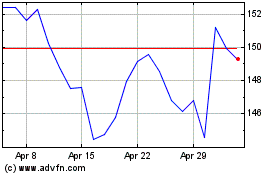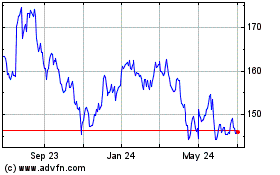By Jared S. Hopkins and Peter Loftus
The blood-clot concerns surrounding Johnson & Johnson's
Covid-19 vaccine pose a new test for the world's biggest
health-products maker.
J&J has faced a number of thorny, headline-grabbing issues
during its 135-year history, from cyanide poisoning of its Tylenol
headache remedy to quality problems with several of the company's
over-the-counter products and cancer concerns about its talcum
powder.
The company's handling of the Tylenol poisoning burnished its
reputation as a high-minded corporate citizen and became a
business-school case study in how companies should handle crises,
while its response to the over-the-counter quality problems hurt
its standing among consumers and the company's consumer-health
business.
U.S. health authorities recommended a pause in the use of the
Covid-19 shot Tuesday, following reports of severe blood clots in
six women who received the shot.
The clots were rare, and regulators are still investigating
whether the vaccine causes the clots.
Yet the issue is forcing the company, a relative newcomer to the
vaccine business, to navigate additional scrutiny over safety of
its shot. However the clot issue is resolved by regulators, the
company will need to respond to concerns held by many in the public
on high alert about vaccine safety.
The company was already working through manufacturing setbacks,
after problems related to the shot's production by a contract
manufacturer.
J&J said Tuesday it is working with health authorities and
medical experts probing the rare blood-clotting issue, and supports
open communication of the information to healthcare professionals
and the public.
Johnson & Johnson, which carries a market cap of $425
billion and notched $82.6 billion in sales last year, is among the
most storied names in healthcare. The company's Band-Aids,
Johnson's Baby products and Listerine mouthwash are staples in many
households.
The New Brunswick, N.J., company's focus has shifted in recent
years from the recognizable consumer products to more advanced --
and lucrative -- prescription drugs and medical devices.
Its arthritis treatment Remicade has been among the world's
biggest-selling drugs, while J&J has introduced new drugs for
various autoimmune conditions, prostate cancer and HIV that have
transformed treatment and helped patients.
Despite its size, J&J has a small presence in the vaccine
market. Its Covid-19 vaccine is the company's only shot cleared for
use in the U.S., although its Ebola vaccine was approved for use by
European regulators last year. Potential vaccines for other
diseases are still in development.
The company said it developed the Covid-19 shot to meet the
challenge presented by the pandemic, not for business purposes, and
is selling its vaccine to government customers on a not-for-profit
basis during the pandemic emergency.
Yet the recommended pause weighed down J&J's stock, with its
shares down nearly 2% early Tuesday afternoon.
Analysts, however, said they didn't expect the clotting issue to
affect J&J's overall business because of its size and
diversity. Analysts said they expect the vaccine's safety concerns
and manufacturing timelines to be discussed next week when the
company reports second-quarter earnings.
The U.S. Food and Drug Administration authorized the J&J
Covid-19 vaccine's use in February, after it was shown to be highly
effective at preventing symptomatic Covid-19.
Health authorities and providers looked forward to the rollout
of the shots. The single-dose shot can be stored at more favorable
temperatures than other vaccines, making it easier to handle at
sites and simplifying vaccination efforts.
The clot issue calls into question the future of the company's
vaccine business, which it began expanding about 10 years ago when
it made a big bet using a new technology called viral vectors.
AstraZeneca PLC's shot uses similar technology as J&J's, and
health regulators have been investigating blood clots involving the
British drugmaker's shot for several weeks.
J&J has faced scrutiny for other products, ranging from
medical devices to its iconic baby powder.
In 1982, J&J weathered a storm involving Tylenol. At the
time, seven people died from taking Extra-Strength Tylenol that
someone had laced with cyanide and placed on store shelves. The
company quickly alerted the public to the deaths and immediately
recalled millions of Tylenol bottles, earning trust among many
consumers.
More than a decade ago, J&J recalled millions of
over-the-counter drugs over quality issues, including Tylenol and
Zyrtec.
Last year, the company said it would stop selling baby powder
made with talc in the U.S. and Canada, a decision that came as the
company faced thousands of lawsuits alleging the talc powder has
harmed women who had used it for years.
J&J has lost trial verdicts and has been ordered to pay
billions of dollars in talc-powder cases, but the company is trying
to reverse such decisions on appeal. The company has said its
talc-containing powder is safe and doesn't cause cancer.
The company is also a defendant in the sprawling litigation
related to the opioids crisis. Johnson & Johnson, which at one
time sold the prescription fentanyl patch Duragesic, and other
companies have been working to broker a deal with state attorneys
general and local municipalities since late 2019.
Write to Jared S. Hopkins at jared.hopkins@wsj.com and Peter
Loftus at peter.loftus@wsj.com
(END) Dow Jones Newswires
April 13, 2021 14:45 ET (18:45 GMT)
Copyright (c) 2021 Dow Jones & Company, Inc.
Johnson and Johnson (NYSE:JNJ)
Historical Stock Chart
From Mar 2024 to Apr 2024

Johnson and Johnson (NYSE:JNJ)
Historical Stock Chart
From Apr 2023 to Apr 2024
